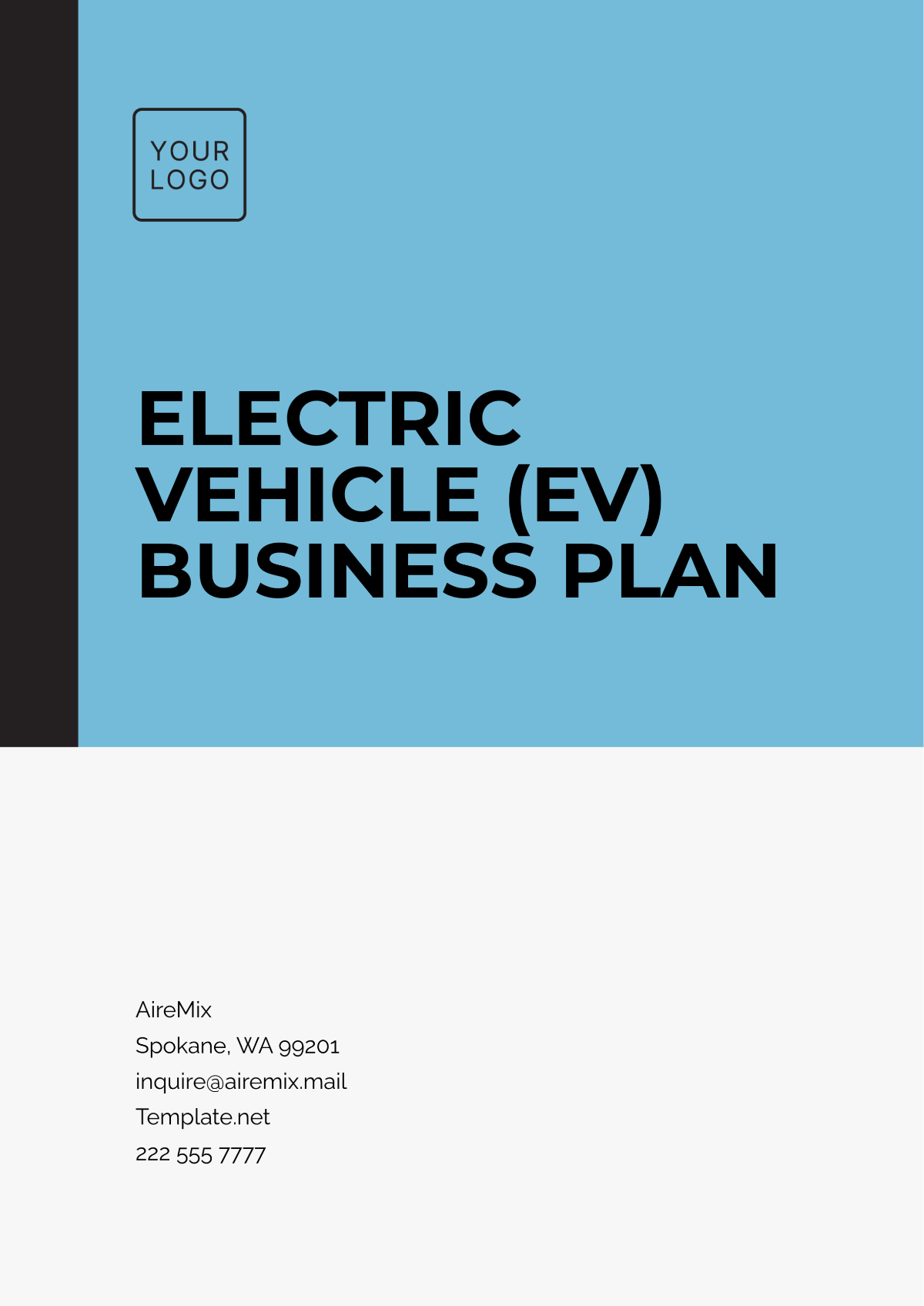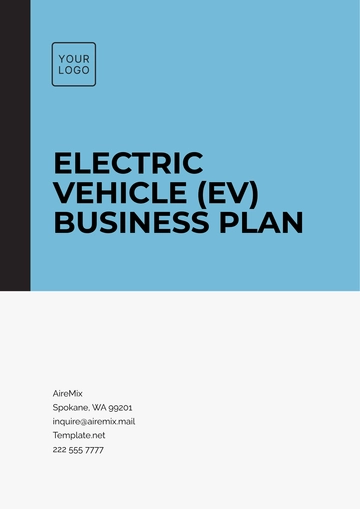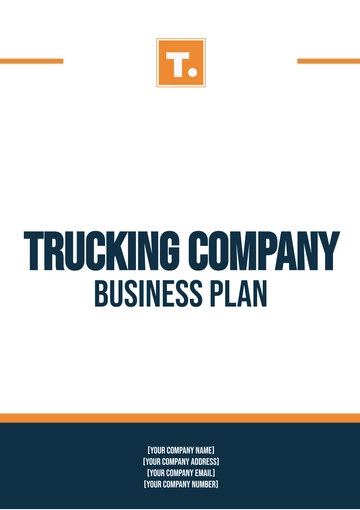Free Electric Vehicle (EV) Business Plan

Prepared by: [Your Name]
Company: [Your Company Name]
Date: [Insert Date]
Executive Summary
[Your Company Name] is a forward-thinking company dedicated to the development, manufacturing, and distribution of electric vehicles (EVs). Our mission is to revolutionize transportation by offering environmentally friendly and energy-efficient mobility solutions. With a commitment to innovation, quality, and customer satisfaction, [Your Company Name] aims to capture a significant market share in the growing EV industry.
A. Business Objectives
Launch the first line of EVs within 18 months of operations.
Achieve a 10% market share in the regional EV market within three years.
Establish partnerships with at least five major suppliers and charging infrastructure providers.
B. Mission Statement
To accelerate the world's transition to sustainable energy by producing electric vehicles that are accessible, efficient, and environmentally friendly.
Business Description
[Your Company Name] will design, manufacture, and sell a range of electric vehicles, including compact cars, sedans, and SUVs. Our operations will focus on:
Designing innovative EV technologies, including high-efficiency batteries and motors.
Offering an ecosystem of products and services, such as home charging solutions and mobile app integrations.
Our target customers include environmentally conscious individuals, fleet operators, and governments seeking green mobility solutions.
Market Analysis
A. Industry Overview
The global EV market is projected to grow at a compound annual growth rate (CAGR) of 23.1% from 2024 to 2030, driven by increasing government regulations, incentives for clean energy adoption, and rising consumer demand for sustainable transportation.
B. Target Market
Urban professionals seeking eco-friendly commuting options.
Fleet operators, including ride-sharing and delivery services.
Governments and organizations transitioning to zero-emission transportation.
C. Market Trends
Growing adoption of EVs due to rising fuel prices and environmental awareness.
Expansion of EV charging infrastructure in urban and rural areas.
Increasing investment in battery technology to improve range and reduce costs.
Competitive Analysis
A. Key Competitors
Tesla: A pioneer in the EV market with a strong brand presence.
BYD: Focuses on affordable EV options and battery technology.
Nissan: Known for producing reliable and accessible EVs like the Leaf.
B. Differentiation Strategy
[Your Company Name] will differentiate itself through:
Affordable pricing without compromising on quality or performance.
Cutting-edge battery technology offers superior range and charging speed.
Comprehensive customer support, including maintenance packages and a dedicated EV support helpline.
Business Structure
[Your Company Name] will be structured as a corporation, led by a CEO with extensive experience in the automotive industry. The management team will include:
Chief Technology Officer (CTO): Overseeing R&D and innovation.
Chief Operating Officer (COO): Managing day-to-day operations.
Chief Marketing Officer (CMO): Leading branding and customer engagement efforts.
Products and Services
A. Electric Vehicles
Compact EV: Affordable, city-friendly vehicle.
Sedan EV: Stylish and spacious model for families.
SUV EV: Rugged and powerful option for adventure seekers.
B. Complementary Services
Home Charging Solutions: Installation of EV chargers at residential properties.
Mobile App: Real-time vehicle monitoring, charging station locator, and trip planning.
Maintenance Packages: Subscription plans for regular servicing and repairs.
Marketing Strategy
A. Channels
Digital Marketing: Social media, search engine ads, and influencer partnerships.
Partnerships: Collaborations with green organizations and EV charging networks.
Events: Participation in auto shows and clean energy expos.
B. Key Messages
EVs are the future of transportation.
[Your Company Name] provides affordable, reliable, and stylish EVs.
Drive green, save money, and reduce your carbon footprint.
Operational Plan
A. Facilities
Manufacturing plant equipped with state-of-the-art robotics and assembly lines.
R&D center focusing on battery innovation and vehicle performance.
B. Supply Chain
Partnerships with global suppliers for batteries, motors, and electronics.
Focus on sustainability by sourcing eco-friendly materials.
C. Distribution
Direct-to-customer sales model via an e-commerce platform.
Experience centers where customers can test-drive and explore EVs.
Financial Plan
A. Startup Costs
$50 million for manufacturing facilities, R&D, marketing, and initial inventory.
B. Revenue Projections
Year 1: $20 million
Year 2: $50 million
Year 3: $100 million
C. Break-Even Point
Expected within the first 24 months of operations.
D. Funding Requirements
Seeking $50 million in funding from venture capital, angel investors, or government grants to cover startup expenses and scale operations.
Risk Analysis
A. Market Risks
Resistance to EV adoption due to higher upfront costs.
Limited charging infrastructure in some regions.
B. Operational Risks
Supply chain disruptions affecting battery production.
High competition from established brands.
C. Mitigation Strategies
Offer financing options to make EVs more affordable.
Collaborate with governments and private entities to expand charging infrastructure.
Conclusion
[Your Company Name] is poised to lead the charge in the EV revolution by offering cutting-edge technology, superior customer experiences, and sustainable transportation solutions. By prioritizing innovation and customer satisfaction, we aim to become a dominant player in the global EV market.
- 100% Customizable, free editor
- Access 1 Million+ Templates, photo’s & graphics
- Download or share as a template
- Click and replace photos, graphics, text, backgrounds
- Resize, crop, AI write & more
- Access advanced editor
You may also like
- One Page Business Plan
- Coffee Shop Business Plan
- Restaurant Business Plan
- Food Business Plan
- Real Estate Business Plan
- Executive Summary Business Plan
- Cover Page Business Plan
- Nonprofit Business Plan
- Daycare Business Plan
- Construction Business Plan
- Startup Business Plan
- Medical Business Plan
- Bakery Business Plan
- Service Plan
- Hotel Business Plan
- Catering Business Plan
- School Business Plan
- Healthcare Business Plan
- Transportation Plan
- Sports Plan
- Car Wash Business Plan
- Salon Business Plan
- Clothing Business Plan
- Farming Business Plan
- Boutique Plan







